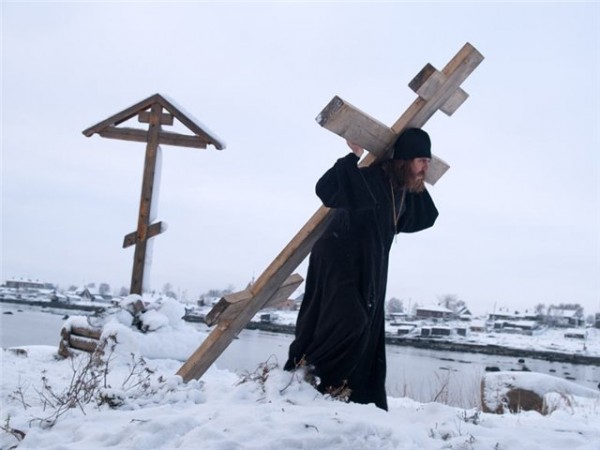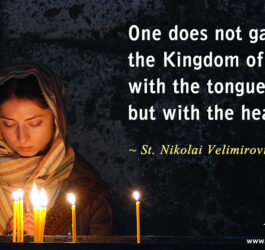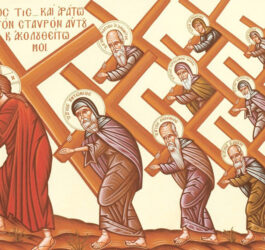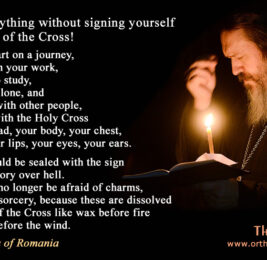 by Chris Banescu –
by Chris Banescu –
“Pick up the cross of your tragedy and betrayal. Accept its terrible weight. Hoist it onto your shoulders and struggle impossibly upward toward the Kingdom of God on the hill. The alternative is Death and Hell.” ~ Jordan Peterson
This wisdom from Jordan Peterson is as close to an Orthodox understanding of what it means to be a Christian as you can get from a non-Orthodox Christian. He speaks the truth and honors the Truth. He helps people understand fundamental principles. A lot of his teaching is grounded in Scriptures. “If any man would come after me, let him deny himself and take up his cross and follow me. For whoever would save his life will lose it, and whoever loses his life for my sake will find it” (Matthew 16:24-25).
I would like to believe that Peterson is a sincere follower of Christ and a trustworthy messenger, even though he himself does not seem to see it or is not willing to admit it. It’s not “flesh and blood” or earthly (godless) knowledge that have revealed these truths to him. It’s evident that the Holy Spirit, the Spirit of Truth, Who proceeds from the Father, co-eternal with Christ (the Logos), illumines some of Peterson’s teaching. This is why his insights have authority. This is why he gives people genuine hope. This is why so many Orthodox Christians listen to Peterson and like him, why they respect his wisdom. This is why millions more also listen to him and trust him. This is why his teaching changes minds and hearts in a meaningful way. This is why his preaching is often impactful and life-changing. This is why so many love this man. This is why some young men who were once atheists are now seeking God.
This is why his words have authority and power.
There is a lesson to be learned here for all of us, especially for Christian leaders, priests, preachers, teachers, apologists, theologians, and bishops. If we are not willing to take our Christian faith seriously, fully surrender our lives to God, speak and defend the truth, pick up our crosses and follow Christ, and be ready to be persecuted for righteousness’ sake, our own lives and teaching cannot be illumined by that same Holy Spirit and our preaching will never be as clear, truthful, convincing, powerful, and life-changing as Peterson’s. The lives of other Orthodox Christian Apostles, Disciples, Fathers, Saints, and Theologians bear witness to this same universal principle and reality.
![]()
This is the Great Truth.
“It is said that man and woman alike are made in the image of God, and that God is He who uses the eternal Logos to generate habitable order from the chaos of potential. This is the axiom. This is the diamond at the center of the world. This is the Spirit in the ark that is untouchable. This is the bedrock of the culture that brings peace and prosperity and that respects the dignity of man. This is the Great Truth. This is the responsibility whose acceptance allows each of us to live despite the catastrophic fragility of our limited being.
Our likeness to God gives each of us a value that transcends the finite. Individual and society alike are charged with the ethical demand to respect that value. This is not only the presumption that grounds the idea of the Rights of Man. It is the presumption that lays upon each of us the Ultimate Responsibility that is the inevitable corollary of those Rights.
Speak the truth. Embody the truth.
Face the chaos of the future.
Employ the Logos of which you are a part to transform that chaos into the habitable order that is Good. Speak the truth. Embody the truth.
Accept, impossibly, the limitations that make Being possible. Dispense in that manner with resentment, hatred, and the desire for infinite and unbounded vengeance and all the cruelty and evil that accompanies it.
struggle impossibly upward toward the Kingdom of God
Pick up the cross of your tragedy and betrayal. Accept its terrible weight. Hoist it onto your shoulders and struggle impossibly upward toward the Kingdom of God on the hill.
The alternative is Death and Hell.” ~ Jordan Peterson
Excerpts from: On the Death and Resurrection: A Psychological View in Five Parts





This was powerful.
“Pick up the cross of your tragedy and betrayal. Accept its terrible weight. Hoist it onto your shoulders and struggle impossibly upward toward the Kingdom of God on the hill. The alternative is Death and Hell.” ~ Jordan Peterson
“If any man would come after me, let him deny himself and take up his cross and follow me. For whoever would save his life will lose it, and whoever loses his life for my sake will find it” (Matthew 16:24-25).
These are actually in contradiction to each other in a fundamental way – Peterson focuses on the self – “your tragedy and betrayal”. The individual is a heroic character “struggling impossibly upward toward the Kingdom of God on the hill” –
Christ focuses on self sacrifice – “The Kingdom of Heaven is at hand” – “Forgive them for they know not what they do” – I’ve yet to read a life of an Orthodox saint who focuses on his or her suffering – I’ve yet to read any of them look at themselves as tragic figures – they understand themselves as fundamentally sinful in the eyes of God – they are made perfect in Christ and whatever befalls them – they accept with a grace, a patience and a love that is utterly otherworldly – far beyond what the world understands as a heroic figure.
Their sacrifice is not a stalwart personal defense of what they believe as they struggle and fight against the tide of whatever injustice or belief system they face – they’re not Ayn Rand figures – they are the bearers of other sins because they see themselves as the most sinful people of all – and that’s the feeling – the understanding of self one has in the face of He Who is perfect and sinless and kenotic in love. -The Saints prayers for others – for those who do wrong in the world – are said with the same empathy and compassion that the Lord has for all who sin – the word for compassion in Greek meaning a level of love and empathy that comes from one’s splachna or guts – that’s the sort of love a parent has for his kid.
The proof of the saints self understanding can be found in the prayers of the Service of Preparation before Holy Communion – read the prayers of St. Basil or of St. Symeon the New Theologian or really any of them.
The image you have above from Ostrov of Fr. Iov carrying the Cross is a reflection of the aforementioned – Fr. Iov’s Cross is his own ego, ambition and belief in an inherent superiority over Anatoly – It’s all the more vexing to him as he sees Anatoly in his own squalor, seeming self-imposed suffering, in his absolute lack of belief in his own goodness or righteousness (“I am unable to live and unable to die”, he cries asking for relief from the thorn in his side) – discovers Christ – and in doing so, in absolute faith relies on Him to alleviate the suffering of others – through miracles – healings – prophecy – and love for the monks who took him in – (he never gets tonsured)
Fr. Iov finally accepts his own Cross – we don’t know what will happen to him but he reaches a deeper state of understanding – and with that there is hope.
That’s the image of the Cross – the realization of ego as the center of sin – not the glorification of the one who is carrying it –